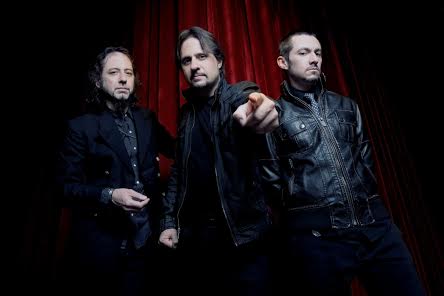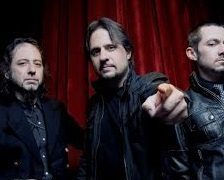[dropcap style=”font-size:100px; color:#992211;”]D[/dropcap]ave Lombardo has, by any reckoning, an extraordinary career.
From defining metal drumming with Thrash titans Slayer, to manning the sticks with Mike Patton (Mr Bungle, Faith No More) and King Buzzo (The Melvins) in avant-garde band Fantomas, the remaining gaps in his attention span are filled with roles in a slew of projects and bands, each an evolutionary step forward.
Lombardo has always had something of an on-again off-again relationship with Slayer, and after a recent round of pay disputes in 2013, it seems like both the band and the drummer have closed the door on any reunions in the near future.
Which is Slayer’s loss rather than Lombardo’s as the drummer’s output outside of Slayer is more tantalising for a fan of fresh music than the impassive majesty of the thrash icons. With rumours circulating of a Fantomas reunion Lombardo is a busy man, and after catching him demolishing the crowd whilst beaming from behind a kit with his prog-punk outfit, PHILM we wondered whether he’s better off leaving his Slayer legacy behind.
Trebuchet: PHILM seems like a lot of fun.
Dave Lombardo : Yeah it is. Especially so with the musicians I have working with me. I’ve known Gerry (Nestler: vocals, guitars) since ’95. Pancho (Tomaselli: bass), we met recently in the past three to four years and it’s been amazing. We’re the kind of band that goes out, we’ll have lunch together, we’ll grab a coffee, we’ll jump in the car blasting some music, and then go back to rehearsal and record. It’s a friendship with camaraderie and respect. It’s good.
It feels like there is more of you in PHILM than there was in Slayer.
Absolutely. Everything is collective in this band. We participate equally, we share the profits equally and we only record when we like the music (we’re making).
It’s all based around improvisation. For instance a typical day goes something like; We wake up, we text each other ‘Hey you guys want to practice? Let’s go’ Then we’ll meet at a local coffee shop that we like to hang out at and then go rehearse.We press ‘record’ on the tape machine and start improvising. After that we’ll take the highlights of the improvisations and then we (actually my son will,he’s the engineer for the band) trim the fat and hold onto the main pieces that we’ve created.
If they feel good and they stick then we’ll go with that.
Gerry writes the lyrics but often he’ll come to us and ask :’Hey what should I do with this line here, I need a word for this section, what do you think?’ So being the producer of the band I get to say what I think feels right, or what the song needs for me.
People often talk to singers and guitarists about meaning in songs, is that possible with drums?
I can be as expressive as I want and the beauty of PHILM is the calibre and ability of each musician to play different styles of music. Pancho comes from funk music but he has a love for metal. He’s been playing funk almost all of his life, from War to Tower of Power. Jerry can play blues, punk, metal and can (also) play amazing piano.I can play different styles, so there’s no limitations. That’s why on this album there are so many different genres that we tap into.
Rumour has it you’re already working on the next PHILM record. How are you going to top it?
I think it’s the same as this record, though it’s a little early to tell. We have six songs and we cover about forty minutes, so we need a bit more music to add to it.
The difference on the album that is coming out next year is that I’ve added double bass. So far I’ve stripped back my drum kit to a four-piece for the first two records, almost to retrain myself, because when you have all these instruments you rely on them, you tend to use the same rolls or double bass parts that you’ve been using for years.
So stripping myself down to a four piece was a sort of creative challenge for me but now that I’m adding the double bass I’m creating a whole different feel for the double bass in this kind of music. It’s not as predominant a part as it was in Slayer, where I brought double bass to almost every song. Here I’ll be adding little tastes of double bass in little places. It’s not a lot but its there.
What does PHILM mean to you?
In the 90s we fooled around with some names, some clichés like ‘something-deth’, you know, something gory.
PHILM, for me obviously, is a band that is able to create images in your mind. Take you through these journeys like a movies does. That was it really. We wanted to create music that really connects with imagery.
Also at that time we were working with a director who was creating a sort of B-movie/short film and we were asked to do the music for it. So it was there that we realised our ability to create textures and sounds and ambient moods that we’ve never heard before. And that’s all down to Gerry, and his seriously amazing guitar playing.
Both Fantomas and PHILM have references to cinema, has one influenced the other?
No, but I did have PHILM going during the (Fantomas) recordings. In fact, PHILM was well on it’s way before that.
Do you ever get existential about the role of drums in a band?
I feel that there is a time in the song where the drummer should let loose a little bit but then there are times when he should let the other members shine. I don’t like to overplay, but when I do (not that I overplay) it’s during a section I feel needs it. You have to be really careful because overplaying is just so redundant, (drumming) has to be done tastefully and creatively.
Are you aware of drummers like Mickey Hart (Grateful Dead) and Airto Moreira (Miles Davis)…?
Planet drum. Oh yeah. I have all those. I have all Mickey Hart’s books. I am fully aware. Oh yeah.
When are we going to get a Dave Lombardo rhythm record?
Actually, I have a lot of recordings. I like to call them drum movements. I have probably 30 to 40 pieces that have been in the works for many years, probably ever since 1995-96.
I don’t know though… I listen back to them and I feel that it could be a lot better. It’s a work in progress that won’t be out any time soon, but it is there and who knows? It might see the light one of these years.
That sounds like a life’s work rather than just a release.
Oh yeah. I laid down everything on those recordings. All the percussion, all the drums, all the arrangements. It almost feels and flows like one song. It’s very cinematic but without strings, just using drums to create the musicality of it all.
Speaking of musicality, what’s your take on drum tonality?
The bass drums need to be very tight. They can’t be loose or slappy, they have to have an immediate response otherwise my kick drum pedal won’t respond to the attack. On my kick drum pedal the tension is fairly tight, that’s from years of playing, and my legs are a little stronger than most, so the tension has to be tight.
Sometimes I get on other drummers’ kits and I’m getting absolutely no response from the bass drum. And they’re wondering ‘Dave how do you do it?’ Well, first off. your gear a little screwed up. You need to tighten everything up to get some response and the same goes for the snare and the toms. There has to be some tension so when you do hit you can go through the drum rolls really fast.I need that response. I remember when my drum tech would tune up my drums. especially my toms, I would tell him bring them up an octave otherwise they’re just too loose.
Do you play from the elbow or wrist?
Wrist, definitely wrist. When I do drum workshops kids ask me whether I flick my finger under the stick to make it go faster and the answer is ‘No, you don’t get any attack that way from the drum’. You need to go from the wrist to get the response that I get. It’s a different approach to most.
Traditional or matched grip?
Matched all the way.
(Stay tuned for part two of this interview next week)

Editor, founder, fan.



















